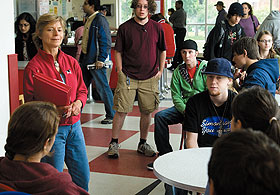  |
| HOME | THIS ISSUE | CALENDAR | GRANTS | BACK ISSUES | < BACK | NEXT > |
FYE seminars offer freshmen opportunity to pursue interestsby Karen A. Grava - October 20, 2008
| ||||
This year’s freshmen come from a wide range of different backgrounds, but one thing a majority have in common is participation in a First Year Experience course. About 2,700 students are taking an FYE class this year, says David Ouimette, director of the program. More than 150 sections of FYE courses are being offered. The program has grown significantly since its introduction in 1996, when 332 freshmen enrolled in the classes. Today, many students take the basic course designed to acquaint students with UConn and with skills such as time management, problem solving, study skills, and the advising and career options available to them. “The basic courses are intended to acquaint students with the University and help freshmen and transfer students adjust to the new expectations they face here,” Ouimette says. “Our goal is to enhance their academic and interpersonal skills.” Other students sign up for seminar courses intended to provide them with an opportunity to investigate topics of professional interest to the instructor through guided research, reading, discussion, and writing. “These courses help students learn independently and engage actively in the academic life of the University,” says Ouimette. Seminar courses range from cooking to digital photography, leadership, health, and the evolution of language. One course keeps students on their feet, learning about how dance has changed through the centuries. “Dance with Jane Austen,” taught by Thomas Roby, associate professor of mathematics, focuses on English country dances that date from 1650 to the present day and the cultures in which they were popular. “Dance has changed over time, along with the mores of society,” Roby says. “In Jane Austen’s time, dances were the only possible unchaperoned time for verbal contact with the opposite sex. So young people really liked dances where there was a lot of standing out and not moving.” Today, he says, people need exercise and dance reflects that, with dancers generally in constant motion. Roby is director of the Quantitative Learning Center, which tutors students in mathematics, but he says he often attends summer camps that feature dances from places such as Transylvania, the Balkans, Norway, and Romania.
Laurel Rabschutz, assistant director of the Bachelor of General Studies program, has turned her love of animals and her background in human development into an FYE course on the bond between animals and people. She has two Newfoundlands and volunteers with them as part of a pet therapy program, but she says the course is not dog-centric. “We are looking at assistance animals, animal-assisted therapy, wildlife, and careers and hobbies involving animals,” she says. Relationships people have with cats, rats, horses, dogs, farm animals, and other animals are examined. Students are asked to read and discuss topics such as how animals are viewed in the media and in commercials; presidential pets; and what happens when the animal-human bond is broken and animal abuse results. In another FYE course, Brian Boecherer, associate director of the Early College Experience Program, is looking at the presidential election in a course called “Political Palm Reading.” The course is looking at who – by race, gender, religion, and other forms of identity – will be voting for each of the presidential candidates. “I encourage students to develop an opinion and defend their opinion with facts,” says Boecherer, who is also a Ph.D. candidate in political science. “The course doesn’t provide concrete answers, but looks at what it means to be American or ‘anti-American,’ and how different cultures view major issues.” He says many American support the death penalty, for example, while many Europeans view it as barbaric. Some people vote one way in a caucus where others can see how they are voting and another way when the ballot is secret. “We will talk about what is happening in various parts of the world, as well as what is happening in the U.S.,” Boecherer says. “My goal is for students to decide for themselves what they feel is right or wrong.” |
| ADVANCE HOME UCONN HOME |

